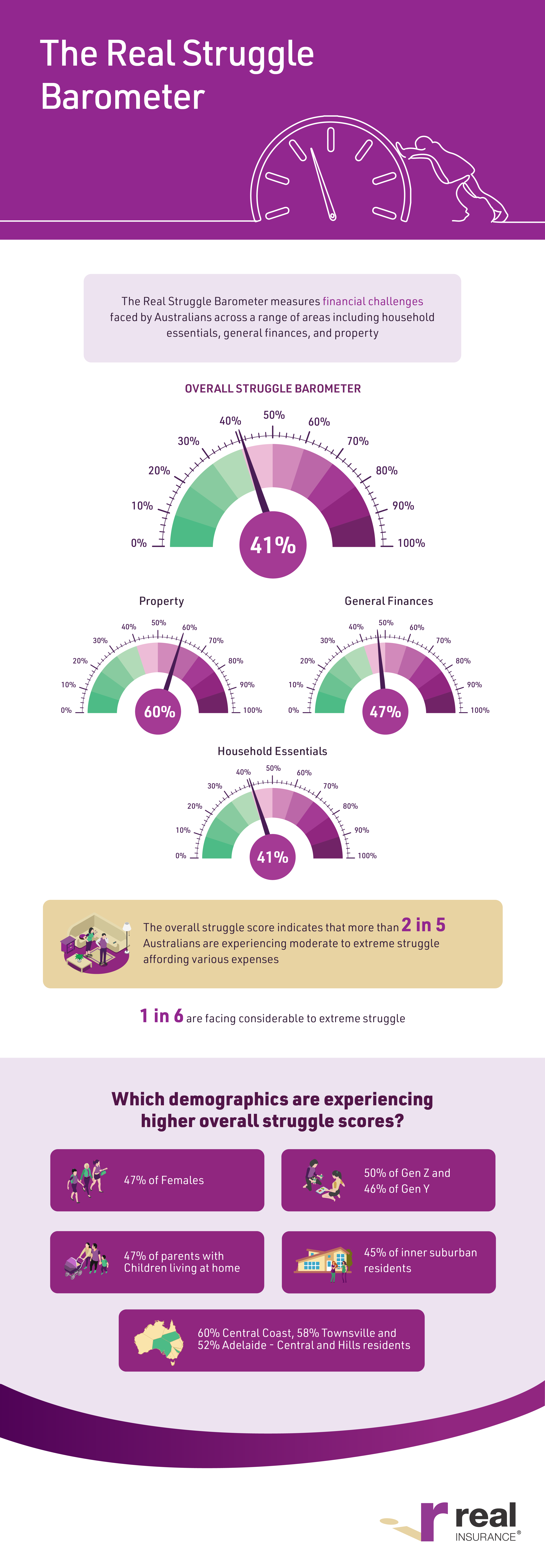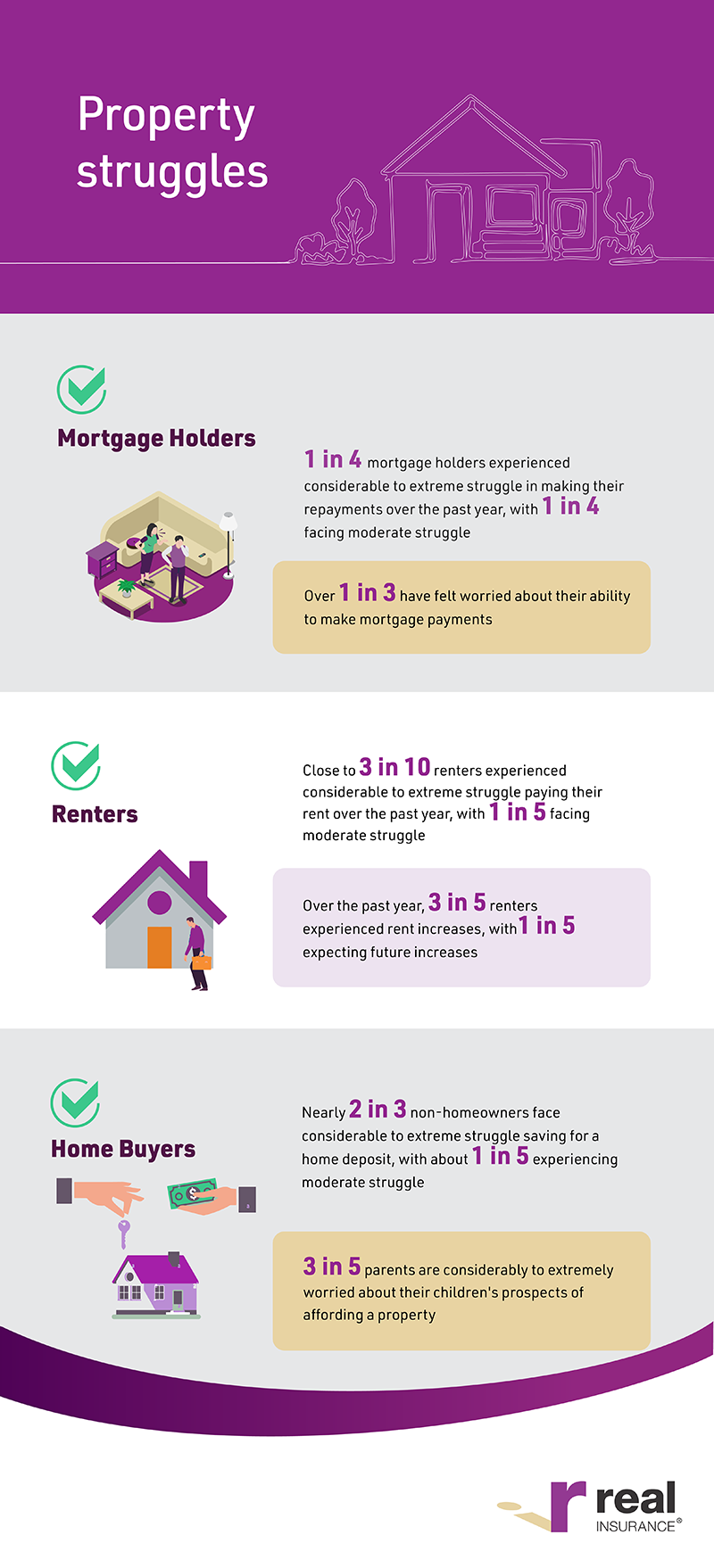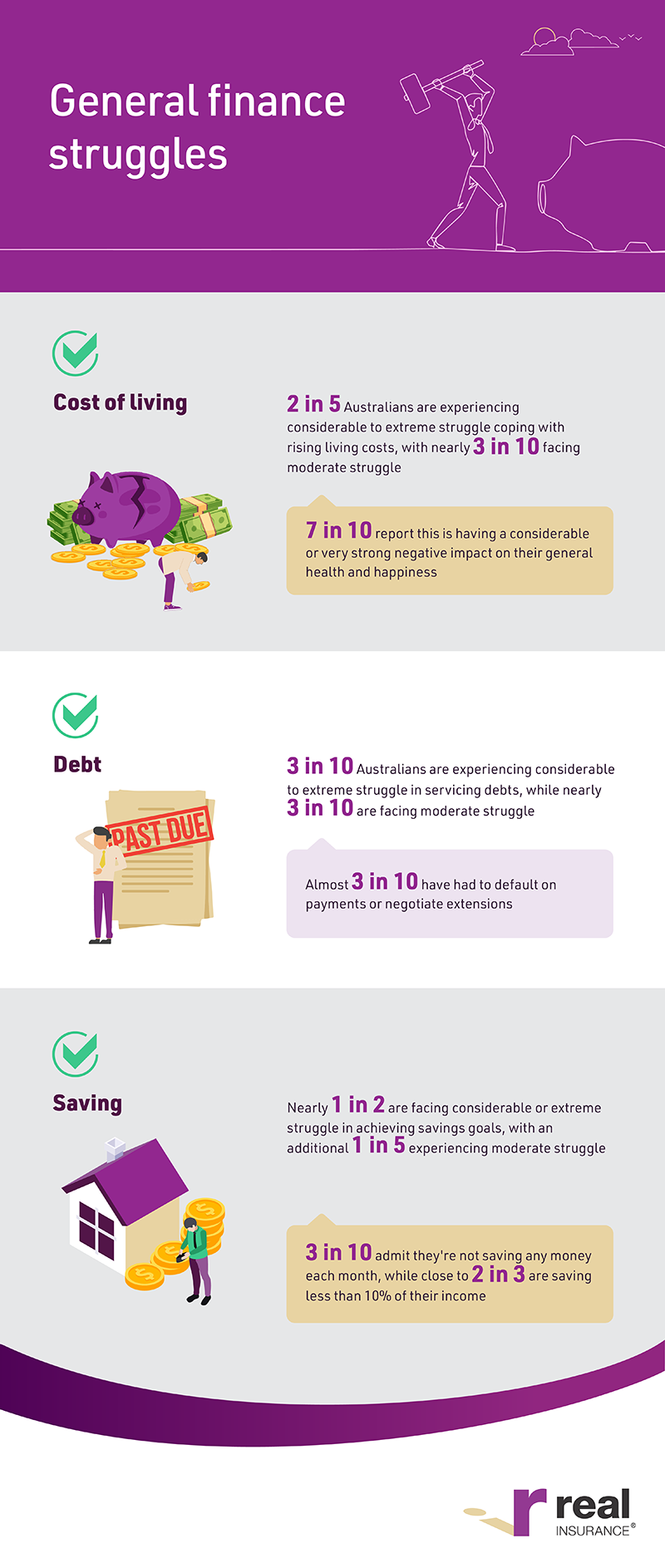The Real Struggle Report 2024
17 Sep 2024
- Almost 7 in 10 Australians (69%) are grappling with financial stress within their households
- Nearly 9 in 10 Australians (87%) are actively cutting back on spending, showcasing a collective resolve to safeguard financial stability amidst adversity
- Household essentials present a challenge for 3 in 5 Australians (57%), with groceries, utility bills, and healthcare expenses weighing heavily on budgets
For many of us, feeling the pinch of the rising cost of living in Australia is a real struggle. Soaring house prices and increasing healthcare expenses are adding to the financial strain faced by families across the country, making it harder to afford necessities.
According to the Real Struggle Report 2024, close to 7 in 10 Aussie households (69%) are dealing with financial stress, and to help combat the rising pressure, a significant portion (87%) are actively cutting back on their spending.
As we grapple with ongoing financial challenges, what lies on the horizon? How are individuals navigating their finances amidst the backdrop of a high cost of living environment, and what toll is this taking on the mental health and overall well-being of the next generation?
The Real Struggle Report 2024 is the latest edition in the Real Insurance research series and explores the areas where Aussies are struggling the most, diving into the sentiment, concerns, and impact of financial pressures on our everyday lives.

The Aussie housing dilemma: Balancing budgets
Grappling with the Australian housing market
As the leading area of struggle across the nation, it’s no surprise that a significant portion of us (60%) are experiencing a moderate or high level of struggle when it comes to managing property-related costs.
For those paying off a mortgage, the burden of loan repayments has reached daunting heights, with the average monthly repayment increasing by $880 over the past 12 months - that’s over $10,000 a year, or a 5% deposit on a home worth over $200,000!
As a result, many Aussies (44%) find themselves grappling with severe challenges in pursuit of the ‘great Australian dream’ of homeownership, while an additional 2 in 5 (38%) encounter varying degrees of difficulty in saving, ranging from moderate to considerable.
With saving for a home deposit proving such a struggle already, parents are understandably worried about their children’s prospects of owning a home, with many willing to let them stay or move back home (56%), or even act as guarantors (27%) to help them get their foot in the door.
Unfortunately, if you’re a renter, you’ll probably find yourself in a similar predicament. The research found that many renters have already experienced a rent increase (61%), with a further 1 in 5 (20%) expecting one soon. With rental increases adding further strain, it's clear both renters and homeowners alike are facing parallel struggles when it comes to the relentless surge in the cost-of-living crisis.

Navigating essential trade-offs
Cutting down day-to-day living expenses
The financial struggles that many of us are facing go far beyond just home ownership and affordability. The rising cost of living has not just seen us tighten our belts and cut back on luxuries – it's also made it a struggle to afford basic household essentials, with almost half of Aussies (47%) experiencing moderate to extreme difficulty when it comes to affording day-to-day items.
For many of us, the struggle is most apparent when it comes to groceries and household bills. Almost 3 in 10 Aussies (29%) report considerable or extreme difficulty affording groceries, while the same number (29%) similar challenges when paying for common household bills.
Perhaps most concerning is the impact the financial stress is having on healthcare accessibility. While it’s normal to put off a dentist appointment here or there, alarmingly, nearly two-thirds of us (65%) are skipping essential medical services, like doctor or dentist visits due to costs.
Other ways we’re trying to control our spending is by cutting back on unnecessary takeaway. The research reveals that more than half of us are cutting back on eating out (65%), opting for cheaper home-brand products (53%), and reducing the usage of expensive ingredients in meals (52%) in order to combat financial struggles.
Aussies are also cutting key appliance usage (51%) to reduce utility bills, seeking better deals before purchasing (45%), and even cutting down on vehicle usage (40%) by embracing alternatives such as public transportation or dusting off the old bike that’s been stashed away in the shed.
Despite these efforts, many of us are still struggling to make ends meet. In fact, 2 in 3 Aussies have picked up a second job to help bolster their income and ease financial pressure. However, this comes at a cost, with many feeling as though they are working more than they would like to (40%), have poor work-life balance (36%), and are reluctant to leave their current job (35%) or ask for a pay rise (21%).

Beyond dollars: The mental toll
The true cost of living affecting mental health
Nearly 7 out of 10 Aussies – yes, a staggering 69% of us – are grappling with significant strain on our household's happiness and overall wellbeing, shedding light on just how profoundly these struggles can affect our mental health and overall quality of life.
For parents, the struggle appears even more apparent, with many finding it hard to hide their stress from their children. While 4 in 5 are trying to shield their children from these issues (84%), two-thirds believe that their children are aware of financial difficulties (66%).
To make ends meet, almost half (48%) have recently utilised the bank of mum and dad or have received or borrowed money from friends and family over the past 12 months. However, this is not without complication, as almost half of those admitting this have said it has caused a degree of tension in the relationship (48%).
The strain is also taking a toll on personal relationships, with negative impacts most felt when discussing financial issues with partners (47%), followed by friends (35%), and parents (30%). This highlights the need for open and honest communication about financial matters, as well as the importance of seeking professional support when needed.
Finally, the research’s overall Struggle Barometer score reveals that more than 2 in 5 Aussies are currently experiencing a moderate or greater level of struggle across all financial categories that were covered in the survey, with those of us along the east coast feeling the strain the most. Among respondents, those in the Central Coast (60%) and Townsville (58%) had the highest overall scores of financial struggle, followed closely by Adelaide Central and Hills (52%).
If you’re feeling the struggle now, it’s clear that you are not alone. Understanding why we might be feeling the rising cost of living at the moment helps us to take informed steps towards easing the strain on our personal relationships and forging a more secure financial future for ourselves and our families.

Noah Yang - Founder & CEO of We Are Mobilise
Challenged by the understanding that no-one in Australia should have to sleep on the street, the Mobilise journey began when Noah and a friend set out with bags of bread to have conversations with those they met. Since that day, Noah has lead We Are Mobilise from a grassroots movement focused on assertive outreach to an ACNC-registered national charity delivering life-changing programs to those facing homelessness.
Noah’s background was in management consulting and he has an inquisitive nature, passionate about leveraging commercial solutions to make a social impact. He has coupled a diverse consulting experience with a global education, informing his passion for innovation and an eagerness to deploy an entrepreneurial approach to business building.
Outside of Mobilise, Noah enjoyed building a project called ‘ASX Investor’ – a digital media channel that amassed 25,000+ total followers and featured interviews with CEO’s from across the ASX.